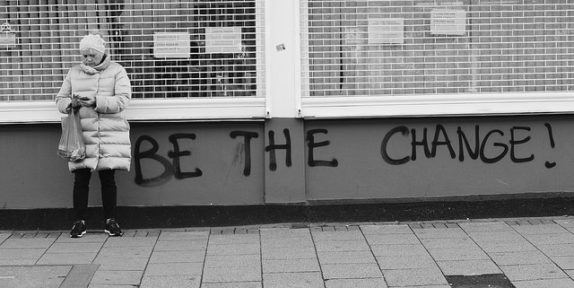
Abby Monkarsh had always cared about animals. She grew up in Jericho, New York, a small Long Island town. When she turned 11, her family adopted their first dog from a nearby animal shelter. She eventually became a vegetarian, and soon after college she was hired to work at an animal hospital in Brookline, Massachusetts, just outside Boston.
Despite her deep love for animals, she had never joined a campaign to advocate on their behalf. Then, one day in September 2015, more than a decade after starting her work at the animal hospital, she heard about an upcoming event at the Massachusetts Society for the Prevention of Cruelty to Animals (MSPCA) just blocks from her apartment. It was her birthday weekend, and since she always liked doing something good for animals on her birthday, Monkarsh went, along with nearly 100 other animal advocates.
The MSPCA, she learned, had partnered with The Humane Society of the United States and other groups in spearheading a statewide campaign to place an animal protection issue on the November 2016 ballot. If they collected enough signatures from registered Massachusetts voters, the issue of extreme farm animal confinement could qualify for the ballot. The campaign needed to collect a staggering 95,000 signatures—about 1,500 per day over two and a half months—to provide Massachusetts voters with an opportunity to vote “yes” to ensure egg-laying hens, breeding sows, and calves raised for veal would no longer be raised in cages and crates so cramped the animals could barely move.
Monkarsh was in. She didn’t waste any time, either. She left the event and walked right across the street to a music festival to begin collecting signatures from strangers. The following week, she collected more signatures at work, and even planted herself outside grocery stores and at busy street corners. Thanks to Monkarsh’s warm, disarming demeanor, most passersby stopped and signed, so she quickly filled up the petition sheets given to her at the event.
With her petition sheets full of signatures, she delivered a thick stack to the campaign headquarters and asked what else she could do. We campaign staffers were excited but skeptical. We probed: How did she get so many signatures so quickly? Just who was she?
Despite having no experience in political campaigning or animal advocacy, Monkarsh knew what she was doing. And we knew we had found a leader.
Unwittingly, political campaigns often create bottlenecks that are unnecessary impediments to engaging volunteers, requiring that paid staff members handle every task. But, inspired by the words of a former Obama campaign staffer in the book Groundbreakers, we knew that training volunteers to lead would be key to our success: “[Volunteers] are our strength, they are part of our strategy. This is how we’ll win.”
Our campaign could’ve chosen to over-manage Monkarsh by dictating where and when she collected signatures, rewriting the spiel she gave to passersby, or creating any other number of constraints. But we didn’t. In fact, we did the opposite: We gave her more freedom and asked her to take on even more responsibility.
Sign up for our free newsletters
Subscribe to NPQ's newsletters to have our top stories delivered directly to your inbox.
By signing up, you agree to our privacy policy and terms of use, and to receive messages from NPQ and our partners.
Over the following weeks, every time someone who lived near Monkarsh wanted to get involved, we sent them to her, and she promptly trained them. This approach of transferring some responsibility from staff to volunteers ultimately freed up staff time and gave volunteers like Monkarsh the opportunity to help lead a political campaign.
When all was said and done, Monkarsh had collected more than 5,000 signatures in her spare time while training new volunteers and inspiring many others. “Having everyone at the campaign office recognize my passion and potential was beyond flattering,” Monkarsh said.
It wasn’t just Monkarsh. There was Elizabeth Kenney in Bourne and Jessica Sosebee in Nantucket, who trained volunteers in areas difficult for campaign staff to reach. Carla and Richard Moss, a retired couple in Byfield, diligently spent one hour each day collecting signatures, sometimes bringing new volunteers along to show them the ropes. Kathy Downey in Newbury, Sheryl Becker in Agawam, and Leslie Luppino in Pittsfield activated their local animal-friendly networks to get involved.
Thanks to the leadership of volunteers and staff, the campaign collected 133,000 signatures, more than any other campaign trying to get on the Massachusetts ballot that year and the only one to do it without hiring a paid signature-gathering firm.
Once qualified for the ballot, we had to mount a campaign that would win 50.1 percent of the electorate—about 1.5 million votes. We were asking voters to cast their ballot in favor of preventing the extreme confinement of chickens, pigs and calves—animals they likely had never interacted with and knew little about. It was no small challenge.
Drawing on the strength of volunteers from the signature-collecting phase we recruited 40 of them to serve as “town captains,” leading door-knocking and other grassroots outreach in their own communities. One volunteer in Cambridge, Curt Rogers, organized other volunteers so extensively that the door of every single consistent voter was visited.
On election night, the hard work of Monkarsh, Rogers, and more than a thousand other volunteers paid off when Massachusetts voters ushered in the nation’s strongest farm animal protection law with an overwhelming 78 percent of the vote. “Looking around the room at all those amazing people who worked so hard and cared so much about these animals,” Monkarsh said, “is a feeling I will never forget.” The commanding win confirmed the humane values we all share—that all animals, in addition to the dogs and cats with which we share our homes, deserve to be protected from cruelty. But it also confirmed that when campaigns empower volunteers, rather than simply manage them, everyone succeeds.









